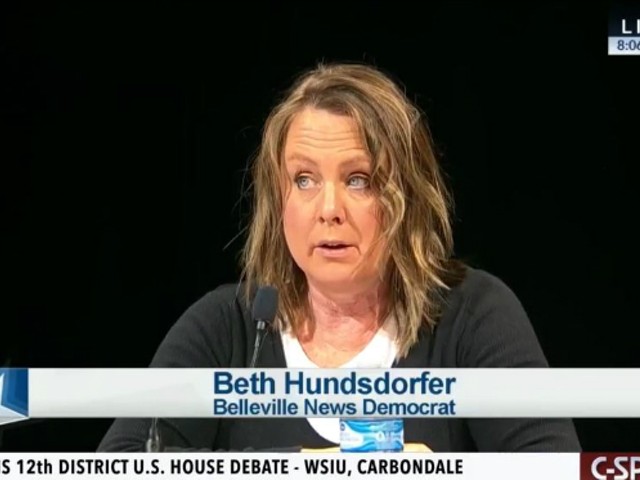
In the weeks since the anonymous letter was released to media, the fallout has been dramatic. Its claims have since made it to social media, grabbing the attention of programmers, volunteers and listeners alike. A planned performance at the Focal Point by the folk group the Short Round Stringband, of which Wells is a member, was cancelled in the face of potential boycotts and demonstrations against Wells. (The Focal Point declined to comment.)
Thomas Crone, an RFT contributor and longtime programmer at the station, viewed the letter with concern. He had been set to work on a KDHX history project as recently as last year, but he says mixed messages from management about the project turned him off the idea. Between that and the allegations outlined in the letter, Crone chose to recuse himself from fill-in duties and pledge pitching until there's a change in leadership, at both the management and board level. He announced his decision on Facebook last month.
Victoria Donaldson, a recent addition to the programming committee and co-host of the station's Rawthentic program, also voiced her concerns as a black woman. "As it shows in this letter and through my personal experience with KDHX, black voices are not given as much value as our white peers," she wrote in a widely shared Facebook post. "Joining the Program Committee was my way to hopefully help KDHX shift the culture and evolve into a more diverse and culturally sustainable station. However, it appears the atmosphere that KDHX has cultivated internally is toxic and dangerous for the institution itself and there's very little that my role on the program committee can help with fixing it."
In a statement to the RFT, she says, "I have no reason to question the contents of the letter or consider them invalid. In which case, there should be a structural overhaul of KDHX because many of these narratives are not new and the culture of KDHX has allowed it for too long. Respect is given when it is deserved."
As for KDHX's board of directors, the lawyer hired to investigate the letter's claims largely cleared the station of any wrongdoing, save for one instance of "racial insensitivity" and one instance of "unwanted advances between volunteers and staff," according to Dever.
The investigation did yield a list of recommendations, including expanded diversity training through outside consultants, prioritizing diversity in recruiting, creating an official diversity and inclusion coordination role in management, improving recordkeeping for complaints, creating additional avenues — such as an anonymous hotline — to file complaints and updating polices on anti-harassment, Dever says. He adds that the station plans to follow all the recommendations.
"I'm happy to report that the review did not substantiate any of the major claims of the letter," he wrote to station associates.
The station's critics are skeptical of the investigation, noting the attorney hired by the board to conduct it spoke to just one former staffer. KDHX didn't name that ex-employee, but Wigfall says it was him. All other former staffers interviewed for this story say they were not contacted. KDHX claims that multiple attempts were made to reach out to each of them, but the former staffers dispute that claim.
Shown Dever's email, Wigfall bristles.
"The allegations in the email are not unsubstantiated when numbers of people are coming out behind it and saying, 'Oh yeah, I've experienced this, oh yeah I've experienced that," he says. "You just didn't — the board wouldn't talk to anybody!"
Four days after Dever's email, Dunn Stewart, who was at the center of a number of the anonymous letter's claims, announced her resignation. In a statement to the RFT, she claims her decision was based on her belief that her "skills, talents and professional contributions were no longer a productive use of KDHX staff time," "no longer the best engagement for the communities it was [her] intention to center," and that her "commitment to this role was no longer a healthy choice" for her. "I wish KDHX nothing but success as they navigate change." Wells says Dunn Stewart's resignation was a personal choice and that she was not forced out.
And while Dunn Stewart's resignation is good news for her critics, the majority of those who spoke to the RFT believe Wells is the real source of the station's dysfunction.
"The only reason this is happening is so we can save KDHX. Because I feel like if Kelly stays there, it'll crumble in on itself on its own," Wigfall says. "She's the common denominator. And I didn't want it to be like that, but that's it. Kelly is going to kill that organization if left to her devices."
Conaway echoes Wigfall's assessment. Wells, she says, has "no business being leadership at KDHX, or anywhere, unless they really have a huge overhaul in how they not only treat people, but how they operate. It comes down to, in my opinion, just poor leadership. Poor management skills. No emotional intelligence."
Townsend agrees that Wells is the main problem but says the board is negligent as well.
"A lot of these board members also, they have to be held accountable too," Townsend says. "This board is just as guilty as well, because they have not done their due diligence in order to keep these people accountable."
The vast majority of staffers and volunteers the RFT spoke to for this story say they want KDHX to thrive. They believe the station is a good thing for St. Louis, a vital resource for local artists and the community at large. But they believe current leadership is failing to live up to its promise. Wigfall says, in a perfect world, KDHX would be similar to the early days of Stax Records, a place where people of all colors come and work together for the betterment of the community and the uplifting of local artists. Conaway wonders why the station doesn't have youth programs to train kids in the community on the ins and outs of broadcasting and other media jobs. Townsend doesn't understand why the station's Folk School, which he says sits empty most of the time, isn't a Roots School focused on a wide variety of music.
"Until the board has people in there that are invested in that vehicle, and until that board has people that are invested in that station working and being executive director, ain't shit gonna change and it's never gonna be a force," Townsend says. "KDHX should be a force."
"God, it just breaks my heart," Conaway says. "Because I want it to be something so great. But I don't know. I don't know what's gonna happen. This could be the end of it. Who the fuck knows? I mean, everything comes to an end. But it'll be sad if it is. It'll be a damn shame if it is."
[Editor's note: This article was edited after publication to note that Townsend was hired in July 2018, not October. We regret the error.]






